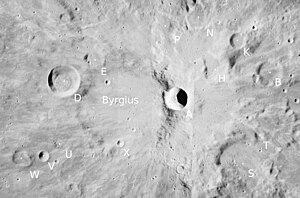Byrgius (crater)
Appearance
(Redirected from Byrgius)
This article includes a list of references, related reading, or external links, but its sources remain unclear because it lacks inline citations. (January 2024) |
 Lunar Orbiter 4 image of Byrgius, with Byrgius A at right, and Byrgius D in upper left | |
| Coordinates | 24°42′S 65°18′W / 24.7°S 65.3°W |
|---|---|
| Diameter | 87 km |
| Depth | 4.6 km |
| Colongitude | 65° at sunrise |
| Eponym | Joost Bürgi |

Byrgius is a lunar impact crater located in the western part of the Moon, near the limb. As a result, Byrgius appears strongly oval in shape due to foreshortening. To the northwest is the nearly ruined crater Lamarck. The rim of Byrgius is worn and eroded, with Byrgius A overlying the eastern rim and Byrgius D lying across the northwest. The floor is relatively flat and undistinguished by significant craters. Byrgius A possesses its own ray system that extends for over 400 kilometres.
Satellite craters
[edit]By convention these features are identified on lunar maps by placing the letter on the side of the crater midpoint that is closest to Byrgius.
| Byrgius | Latitude | Longitude | Diameter |
|---|---|---|---|
| A | 24.5° S | 63.7° W | 19 km |
| B | 23.9° S | 60.8° W | 23 km |
| D | 24.1° S | 67.1° W | 27 km |
| E | 23.5° S | 66.2° W | 18 km |
| H | 23.7° S | 62.4° W | 27 km |
| K | 23.0° S | 61.8° W | 14 km |
| N | 22.3° S | 63.1° W | 20 km |
| P | 22.6° S | 64.1° W | 19 km |
| R | 26.5° S | 60.7° W | 7 km |
| S | 26.2° S | 61.4° W | 43 km |
| T | 25.1° S | 61.5° W | 5 km |
| U | 25.8° S | 67.2° W | 13 km |
| V | 26.0° S | 67.8° W | 9 km |
| W | 26.1° S | 68.5° W | 14 km |
| X | 25.7° S | 65.4° W | 6 km |

References
[edit]- Andersson, L. E.; Whitaker, E. A. (1982). NASA Catalogue of Lunar Nomenclature. NASA RP-1097.
- Blue, Jennifer (July 25, 2007). "Gazetteer of Planetary Nomenclature". USGS. Retrieved 2007-08-05.
- Bussey, B.; Spudis, P. (2004). The Clementine Atlas of the Moon. New York: Cambridge University Press. ISBN 978-0-521-81528-4.
- Cocks, Elijah E.; Cocks, Josiah C. (1995). Who's Who on the Moon: A Biographical Dictionary of Lunar Nomenclature. Tudor Publishers. ISBN 978-0-936389-27-1.
- McDowell, Jonathan (July 15, 2007). "Lunar Nomenclature". Jonathan's Space Report. Retrieved 2007-10-24.
- Menzel, D. H.; Minnaert, M.; Levin, B.; Dollfus, A.; Bell, B. (1971). "Report on Lunar Nomenclature by the Working Group of Commission 17 of the IAU". Space Science Reviews. 12 (2): 136–186. Bibcode:1971SSRv...12..136M. doi:10.1007/BF00171763. S2CID 122125855.
- Moore, Patrick (2001). On the Moon. Sterling Publishing Co. ISBN 978-0-304-35469-6.
- Price, Fred W. (1988). The Moon Observer's Handbook. Cambridge University Press. ISBN 978-0-521-33500-3.
- Rükl, Antonín (1990). Atlas of the Moon. Kalmbach Books. ISBN 978-0-913135-17-4.
- Webb, Rev. T. W. (1962). Celestial Objects for Common Telescopes (6th revised ed.). Dover. ISBN 978-0-486-20917-3.
- Whitaker, Ewen A. (1999). Mapping and Naming the Moon. Cambridge University Press. ISBN 978-0-521-62248-6.
- Wlasuk, Peter T. (2000). Observing the Moon. Springer. ISBN 978-1-85233-193-1.
External links
[edit] Media related to Byrgius (crater) at Wikimedia Commons
Media related to Byrgius (crater) at Wikimedia Commons

